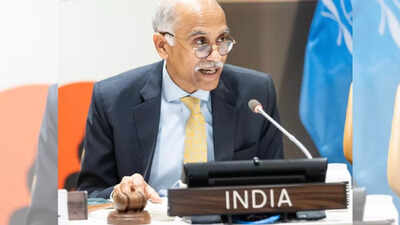[ad_1]
NEW DELHI: India on Tuesday told the United Nations Security Council (UNSC) that maritime security and counterterrorism were central to its national security and economic interests. India’s permanent representative to the UN in New York, Parvathaneni Harish, made the remarks while addressing a high-level UNSC open debate on ‘Maintenance of international peace and security: Strengthening maritime security through international cooperation for global stability’.“India views maritime security and countering terrorism as central to its national security and economic interests. Its approach balances robust defence capabilities, regional diplomacy, international cooperation and domestic infrastructure development. It continues to evolve its strategy in response to new threats and geopolitical shifts in the Indo-Pacific region,” Harish said. The ambassador also highlighted India’s responsible and proactive maritime approach in safeguarding its interests and responding to emerging threats. “With a long coastline, an extensive seafaring community, and capable maritime forces, India is actively pursuing its role as a responsible maritime power,” he said. The diplomat also noted that India was undertaking robust capacity-building initiatives to address modern security challenges and to enhance maritime combat capabilities, strategic planning, and governance. Citing India’s efforts to combat piracy, Harish informed the council that India had deployed over 35 naval ships in the western Arabian Sea, conducted more than 1,000 boarding operations, responded to over 30 piracy-related incidents, and saved 520 lives of various nationalities. Additionally, India escorted 312 merchant vessels, protecting cargo valued in billions of dollars, Harish said. He underlined India’s active role in search and rescue (SAR) operations and humanitarian assistance and disaster relief (HADR), particularly in the Indian Ocean region. Harish further recalled that the significance of maritime security was underscored by Prime Minister Narendra Modi during the first-ever UNSC open debate on the issue, held under India’s presidency in August 2021.Indian’s maritime securityIndia’s long coastline of over 7000 kilometers provides a significant advantage in maritime trade and connectivity, but also necessitates a strong and vigilant maritime security. The openness and stability of the Indian Ocean Region (IOR) face increasing threats, especially due to China’s strategic expansion, including military bases and overseas ports such as the Hambantota port in Sri Lanka and the Gwadar port in Pakistan, among others. The Indian Ocean Rim Association (IORA) is an intergovernmental organisation that fosters regional collaboration and development among nations bordering the Indian Ocean. The term “Free and open Indo-Pacific,” championed by countries like India, United States, Japan, and Australia, reflects a shared vision to counter China’s growing dominance in the region.India maintains a powerful naval force equipped to counter emerging threats, comprising submarines, surface combatants, and two operational aircraft carriers: INS Vikramaditya and INS Vikrant, among others. During the 1971 Indo-Pakistani War, the Indian navy played a crucial role, especially through the successful attack on Karachi harbour under Operation Trident.Under the Sagarmala Project, the government of India has been developing ports and upgrading maritime infrastructure to enhance economic viability and ensure maritime security.In ancient and medieval India, the country possessed notable naval power, with historical evidence of overseas trade and maritime military expeditions, particularly during the Chola dynasty, which conducted successful naval campaigns across Southeast Asia.
[ad_2]
Source link

